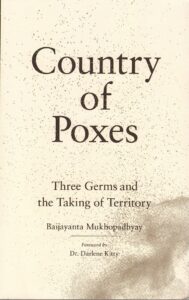Book review: Country of Poxes: Three Germs and the Taking of Territory
Baijayanta Mukhopadhyay’s Country of Poxes: Three Germs and the Taking of Territory is a marvellous thought-provoking exploration of three diseases – syphilis, smallpox, and tuberculosis – intertwining with Canadian (and global to an extent) colonialism, dispossession, and desire of settlers to impose control.
As a doctor and scholar from Bengal who works closely with Indigenous people in Eeyou Istchee, Treaty 3 and 9 territories, as well as others on the margins of Canada, Mukhopadhyay offers an unique and often personal perspective on colonial health care. Part of this is drawn from his personal and familial experiences with colonized health practices in Bengal and then as an immigrant. His monograph work consists of five chapters, three of which focus on the three “germs”, and a conclusion that offers thoughts on pathways forward to reconciliation and undoing colonial damages. Overall, this work intertwines Mukhopadhyay’s familial, immigrant, and clinical experiences with historical narratives to create an engaging and informative read.
Mukhopadhyay begins by exploring, in Chapter 1, “How Infections Have Defined Humanity”, how humans, societies, and medical practices have been informed by disease and infection throughout our history. Specifically noting that as much as germs “choose how will suffer, how, and for how long. We choose [how we suffer,] too.” Herein is the crux of Mukhopadhyay’s argument. Human agency is responsible for creating conditions for germs to flourish, who the germs will infect to a greater degree, as well as responses, categorizations, and treatments. This is followed up in Chapter 2, “Syphilis”, where Mukhopadhyay notes, for instance, that the ongoing debate surrounding the origins of syphilis says more about colonial narratives, morality, and sexuality than its historical and ongoing societal impact. The debates also obscure the historical records of colonizers, explorers, traders, and other representatives of European societies spreading syphilis globally.
Chapter 3, “Smallpox”, nicely links how this disease helped to clear lands for colonial settlements as well as how Canada in the nineteenth and early twentieth centuries used quarantines and health measures to dispossess Indigenous people of land and health sovereignty. Additionally, Mukhopadhyay discusses how governments and corporations introduced variolation and later, vaccination of Indigenous peoples when their interests – land, profits, or threats to white communities – were threatened by outbreaks.
In Chapter 4, “Tuberculosis”, Mukhopadhyay discusses how the apparent endemic nature of tuberculosis in Indigenous communities was fuelled by Indian Residential Schools, confinement to reserves, poor housing, lack of nutritional foods, and eroded economies – all linked to colonial policies and practises of the Canadian state. Furthermore, he shows that tuberculosis treatment for Indigenous people was governed by federal parsimony and racism that led to the creation of segregated hospital wards and Indian hospitals. Not surprisingly, like syphilis and smallpox, tuberculosis infections are tied to Indigenous displacement from land, economic dislocation and change, as well as enforced sedentarism and substandard housing.
The final chapter, “How We Respond to Infections to Come,” offers several suggestions for improving Indigenous healthcare while mitigating or eliminating harm within the healthcare system. For me, the two key recommendations by Mukhopadhyay rest on ensuring people, particularly healthcare providers, to be aware of the colonial history of Western medicine and the necessity in implementing Indigenous control or oversight of their healthcare.
I highly recommend this book. It speaks to those interested in healthcare, history, reconciliation, and Canada’s past. Mukhopadhyay’s writing is incredibly accessible, making his experiences with and perspectives on Canada’s colonial project and system interconnectiveness to syphilis, smallpox, and tuberculosis abundantly clear.
Baijayanta Mukhopadhyay, Country of Poxes: Three Germs and the Taking of Territory. Halifax: Fernwood Publishing, 2022.



